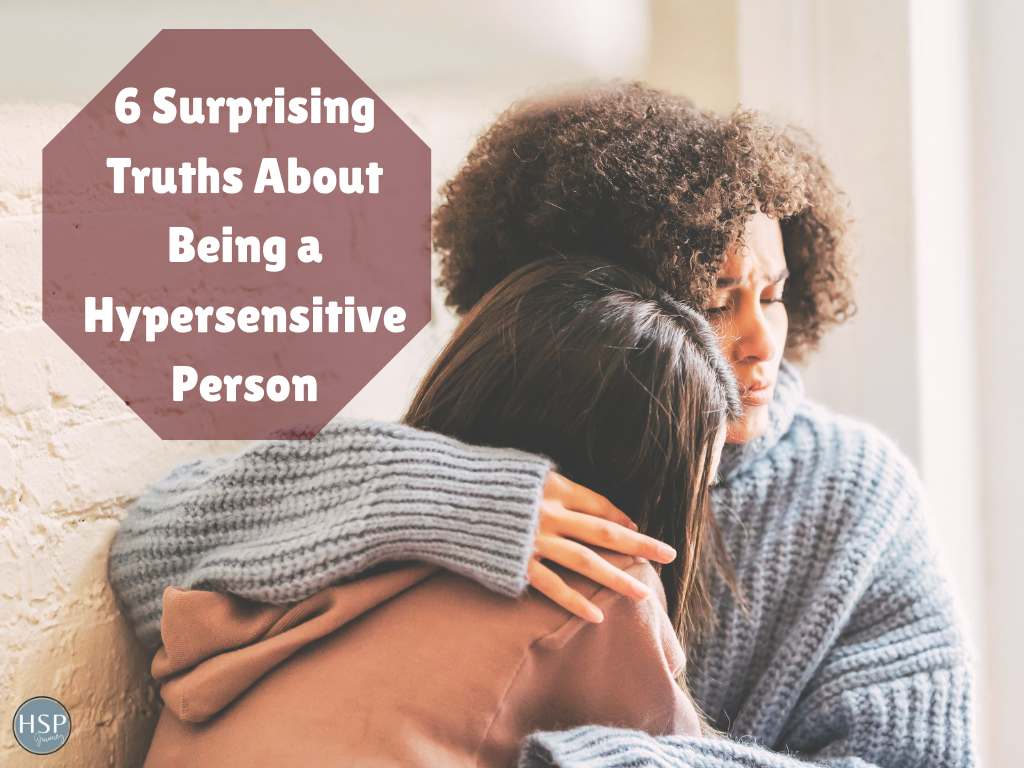Have you ever been told you’re “too sensitive” or asked why you react so strongly to everyday events? It’s common for people to mistake a highly sensitive or hypersensitive nature for a flaw or weakness, but this trait is much more complex than people realize. Being a hypersensitive person means you process emotions, environments, and social cues more deeply and intensely than most, and it is called the highly sensitive person trait (HSP)–a personality trait and not a flaw or disorder.
If you often find yourself overwhelmed by loud noises, bright lights, or even the emotional temperature of a room, you’re not alone. People who are hypersensitive aren’t just easily upset—they notice subtleties most people miss and can experience both the highs and lows of life with extra vividness.
Understanding what it actually means to be a hypersensitive person can help you appreciate your strengths and navigate challenges more easily. To learn more about how sensitivity impacts your life and how to thrive with it, it can be helpful to spend timing developing your awareness around what it means to be hypersensitive, learning the many positive aspects of the HSP trait.

Table of Contents
Truth #1 – The Hypersensitive Person is Really Someone With The Highly Sensitive Person Trait (HSP)
When people talk about a “hypersensitive person,” they usually mean someone with high sensitivity, not a medical or psychological condition. The correct term for this is Highly Sensitive Person (HSP), also called Sensitivity Processing Sensitivity (SPS) in scientific research.
If you find yourself easily affected by loud noises, bright lights, or strong smells, you might relate to the HSP trait. About 1 in 3 people may have this kind of sensitivity, regardless of gender. It is not rare and is considered a normal variation in how people process information and emotions.
Here’s a simple way to spot HSP traits:
| Common HSP Experiences | Examples |
|---|---|
| Deep processing | You reflect for a long time on things |
| Easily overwhelmed | Crowds or busy places tire you quickly |
| Strong emotional reactions | You react deeply to both good and bad news |
| Noticing subtleties | You spot small changes others miss |
There is no medical diagnosis or treatment for HSP because it is not a disorder. The concept of HSP was introduced by psychologist Elaine Aron, and it focuses on how your nervous system responds to external and internal stimuli (learn more about HSP).
When someone labels you as “hypersensitive,” they’re probably describing these normal, research-backed traits. This isn’t the same as being weak or overly emotional—it’s simply a different way your brain and body handle sensory input.
Truth #2 – It’s Hard Being a Hypersensitive HSP Person
Being a hypersensitive HSP can feel exhausting. Your senses are always picking up on little details that others miss, and your mind often holds onto these experiences longer than most.
You might notice background noises, bright lights, or even subtle shifts in other people’s moods right away. While these abilities can be helpful, they can also cause quick overstimulation and overwhelm. Everyday situations—like loud gatherings or crowded spaces—may feel much more intense for you.
It’s common to find yourself replaying conversations or events in your head afterward. You reflect deeply and often worry that you might have missed something or upset someone. This tendency can make it tough to relax, especially after a long day. We also often take things very personally, which can be hard.
Reasons why it can feel hard as an HSP:
- You process emotional and physical stimuli more deeply
- You may need more downtime to recover from busy days
- Social or sensory overload happens quickly and is hard to shake
- You notice and care about things that others may overlook
According to experts, highly sensitive people feel deeply and have a more sensitive nervous system, making everyday life seem overwhelming at times.
It’s important to remember that your reactions are valid. Needing rest or quiet isn’t a flaw—it’s just your way of taking care of yourself.
Truth #3 – The World Is Actually Overwhelming In A Lot Of Ways
It’s not just you—modern life really can feel overwhelming. Loud noises, crowded spaces, endless to-do lists, and quick changes are part of daily routines that can be hard to handle.
Here are a few things that often make the world feel like “a lot” for a hypersensitive person:
- Constant notifications and information overload
- Bright lights and noisy environments
- Busy schedules with little downtime
Even small tasks can sometimes seem exhausting. When everything is coming at you at once, you may feel like it takes enormous effort just to cope. It’s common to feel depleted after regular social or work situations. You’re not alone—many people are affected by this fast-paced world, not just highly sensitive individuals.
According to psychology experts, the modern world is filled with overstimulating, demanding situations. This isn’t just your imagination. The endless stream of expectations and stimulation can make daily life challenging, especially if your emotions are easily triggered.
You might notice:
| Symptom | Example |
|---|---|
| Emotional overwhelm | Feeling anxious or easily upset |
| Physical fatigue | Needing more rest |
| Trouble focusing | Difficulty with decisions |
It’s completely normal to feel this way. Being aware that the world is overwhelming in many ways can help you take steps to manage your experience and set healthier boundaries.
Looking for HSP Tools to Thrive in a Chaotic World?
The modern world is often overwhelming and stressful for those of us with sensitive nervous systems. Many of us have suffered from the challenges of high stress, anxiety, sensory overload, and mental health and physical health issues. Fortunately, after years of working with and researching Highly Sensitive People (HSPs), Julie Bjelland has developed many tools that have not only helped her but thousands of HSPs all over the world move out of survival mode living and into thriving. In this free webinar, she’ll share the tools that HSPs have found the most life-changing. Her goal is to help you live to your fullest potential because the world needs you.
Join this free webinar and get tools to help you thrive as an HSP!
Truth #4 – Navigating Emotions can be Extremely Difficult
If you’re a hypersensitive person, emotions can feel more intense and overwhelming for you than for others. You might pick up on subtle emotional cues, causing even small interactions to affect you deeply.
Contrary to common belief, these intense emotions are not “bad” or negative in themselves. In fact, feeling sadness, fear, or anger doesn’t mean there’s anything wrong with you. It’s normal for you to feel things strongly, even if it happens more often than for others. For more on this, see the truth about overwhelming emotions.
You may also notice that your moods can shift quickly. This is often because stimuli like noise, bright lights, or even tense conversations can trigger strong emotional responses in you with little warning.
Some typical challenges you might experience:
- Emotional exhaustion after social events
- Difficulty processing criticism
- Feeling stressed by conflict or negativity
It’s helpful to remember that you are not alone in this experience. Many highly sensitive individuals share these struggles, and acknowledging them is a positive step. Developing self-acceptance and naming your emotions can be useful ways to manage overwhelming feelings. Journaling or talking to someone supportive might help you make sense of what you’re experiencing.
If you want more coping techniques, consider these traits and tips for navigating life as a highly sensitive person.

Looking for an HSP-Trained coach to help you align your life with your priorities?
Through my Highly Sensitive Person (HSP) certification with the Nickerson Institute, as well as being an HSP, I offer HSP coaching to develop specific goals around your HSP needs. We HSPs frequently deal with anxiety and overstimulated nervous systems that prevent us from achieving peace and attaining our life goals. HSP coaching with me includes a detailed review of your sensitivities and a mutually-desired plan for growth and management of this superpower to shift negativity and begin seeing yourself as the hero of your own story. (Affordable monthly coaching begins at $150/month.)
Truth #5 – HSPs Struggle To Connect Yet Also Connect Extremely Deeply
If you’re a highly sensitive person (HSP), you probably notice that making connections can sometimes feel overwhelming. Big social gatherings or casual small talk might drain you faster than most.
You may find yourself needing downtime after being around others. Loud environments or lots of chatter can sometimes make you want to withdraw.
But when you do connect, your relationships often go beyond surface level. You may form strong bonds, feeling empathy and understanding in a way that others might not. According to experts, HSPs are known for being empathetic and deeply attentive listeners.
Common experiences for HSPs in relationships:
| Challenge | Deep Connection |
|---|---|
| Feeling easily overwhelmed | Sensing others’ emotions |
| Needing space to recharge | Building trust quickly |
| Struggling with small talk | Noticing unspoken feelings |
You might prefer meaningful conversations over idle chatter. While this makes it hard to keep large circles of friends, your close relationships can be especially supportive and fulfilling.
It’s also possible to struggle with loneliness if your need for depth isn’t met. Recognizing this mix of challenges and strengths is common among HSPs, as highlighted in articles about the challenges of friendship for highly sensitive people.
Truth #6 – Hypersensitive HSPs Often Understand Others Better Than They Understand Themselves
If you’re a hypersensitive person, you may notice how naturally you sense what others are feeling, often before they say a word. Your empathy is strong and you might often “read the room” instantly, picking up on subtle shifts in mood or energy.
Why does this happen?
- Your brain is wired to notice small details.
- You process social cues more deeply than most.
- Other people’s feelings can feel almost as real as your own.
| Characteristic | Impact on You |
|---|---|
| Heightened empathy | Spotting hidden emotions |
| Deep listening | Remembering what matters |
| Quick intuition | Sensing tension or joy |
However, because you’re so focused on others, there’s a chance you forget to check in with yourself. It’s easy to lose sight of your own needs or emotions while paying close attention to everyone else’s.
Some signs you may notice:
- You feel drained after social situations
- You quickly sense others’ discomfort, but can’t name your own
- You’re often called a “great listener”
By recognizing these patterns, you can start to balance your attention between others and yourself. For more on these traits, see the empathy and self-awareness in HSPs discussion.
Frequently Asked Questions
Many people find themselves wondering about daily life strategies, common traits, professional support, notable examples, and the links between sensitivity and mental health challenges. You can find practical advice and answers to some of the most common questions about being a highly sensitive person here.
What coping strategies are effective for highly sensitive people?
You can benefit from creating a calm environment and allowing yourself breaks during stressful times. Mindfulness practices, such as meditation and deep breathing, help you manage emotional overwhelm. Setting clear boundaries and learning to say no may help reduce stress and anxiety for you as a highly sensitive person.
Connecting with others who understand your experiences can offer you valuable social support. Joining groups such as my Artist’s Way group coaching program can help bring you close to HSPs who are like-minded and available to connect deeply about things that matter.

The Artist’s Way Group for Highly Sensitive Persons (HSPs)
12-Week Journey to Unlocking Your Inner Creative
Looking for new ways to release your inner creativity and attain your goals for a more creatively inspired life?
Come join me for 12 weeks of exploring creativity and self-discovery in a safe space for highly sensitive individuals! This group will be led by Lauren Hunter via Google Meet video.
Next group begins August 8, 2025 at 10am PST/Noon CST
Investment: $249
Are certain personality traits common among hypersensitive individuals?
You might notice you experience strong emotional reactions and are deeply affected by sensory input, like light, sound, or crowds. Empathy tends to be a prominent trait, making it easy for you to understand and share the feelings of others. Many highly sensitive people value meaningful, deep connections and are conscientious about their actions.
According to Simply Psychology, self-awareness and careful decision making are also frequently observed traits among highly sensitive individuals.
How do healthcare professionals approach the treatment of high sensitivity?
Healthcare providers usually recognize that high sensitivity itself is not a disorder. You may be supported with stress-reducing techniques, lifestyle adjustments, or therapy focused on self-acceptance and emotional regulation. Approaches are tailored to your unique needs, considering the challenges and strengths sensitivity brings.
Professionals can help you identify triggers, build resilience, and foster positive coping strategies rather than aiming to “fix” sensitivity. Spending time attuning to your nervous system can provide robust returns.
Can you name any public figures who are known to be highly sensitive?
Some well-known authors, musicians, and actors openly identify as highly sensitive. For example, musician Alanis Morissette and actor Winona Ryder have spoken publicly about their experiences with sensitivity. Many creative professionals believe their heightened awareness enhances their art and personal lives.
If you are looking for role models, their stories often provide encouragement and a sense of belonging in a world that may feel overwhelming at times.
Is there a connection between high sensitivity and specific mental health conditions?
High sensitivity is not a mental health disorder, but you may notice some overlaps in symptoms with anxiety or depression, especially if your sensitivity often leads to overwhelm. Studies confirm that being highly sensitive can increase your risk of stress-related conditions if your environment is unsupportive.
Resources like HSP Tools clarify that while there is a relationship, high sensitivity and mental illness are not the same, and the right support can help you thrive.
How do I know if I’m a Highly Sensitive Person (HSP)?
This is a great question. Many people who are highly sensitive feel that they were not understood as children. They were frequently told they were too sensitive or cried too often. You can reference our list of HSP quizzes to see how you score and this can inform whether or not you are a Highly Sensitive Person.
Be sensitive, be free
*This post contains affiliate links and I will be compensated if you make a purchase after clicking on my links*




